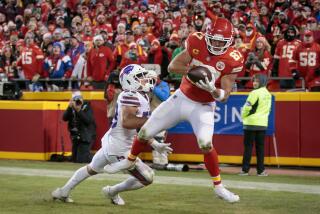NBC Defends Late Switch to Lakers
- Share via
There’s no question that the end of any overtime NBA playoff game gets priority over the first quarter of any other NBA playoff game.
But when that other game is the Lakers and Seattle SuperSonics and you’re a Los Angeles fan and there is a 10-point differential late in the overtime game, things change.
After Reggie Miller’s three-point basket gave the Indiana Pacers a 112-102 lead over the New York Knicks with 1:28 left in overtime Sunday, it would seem that it was time for NBC to switch to the Lakers and SuperSonics in Los Angeles and Seattle.
But NBC chose to stick with the Knicks and Pacers until the end--and through a postgame interview with Miller--before switching to the Laker game. By then, the score was 25-25 with 1:40 left in the first quarter.
“You can’t have it both ways,” NBC spokesman Ed Markey said. “You can’t please two masters. We were committed to stay with the game that people across the country had already invested 2 1/2 hours in.”
Asked about at least switching in L.A. and Seattle, Markey pointed out that six updates were inserted into the Pacer-Knick telecast. “And the score was 25-25 when we switched,” he added, implying viewers hadn’t really missed much.
What if the situation had been reversed and it was a Laker-SuperSonic overtime wiping out the first quarter of the Pacers and Knicks? Wouldn’t NBC have switched off the Lakers and SuperSonics to go the the start of the Pacers and Knicks in Indianapolis and New York?
You can imagine viewers in New York, where NBC Sports is based, not taking kindly to missing the start of any game involving the Knicks.
“The situation would have been the same,” Markey said. “We would have stayed with the overtime game.”
What about a split screen?
“No way,” Markey said. “We would never do that. NBC never uses split screens on anything. The problem is you’re trying to please too many people and you end up not pleasing anyone.”
The NFL has a rule that requires networks to switch to the markets of teams involved before the kickoff.
“It’s not a comparable situation,” Markey said. “You’re talking about regular-season regional telecasts. This was a nationally televised playoff game.”
More to Read
Go beyond the scoreboard
Get the latest on L.A.'s teams in the daily Sports Report newsletter.
You may occasionally receive promotional content from the Los Angeles Times.










